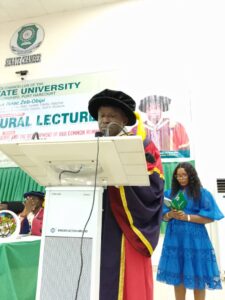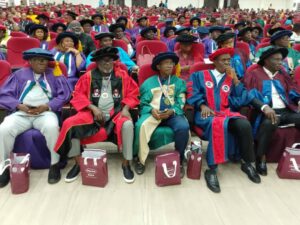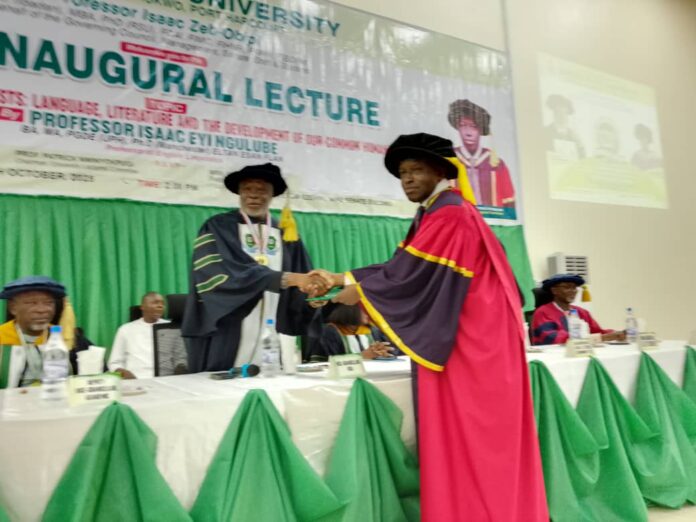At Rivers State University’s 121st Inaugural Lecture, Professor Isaac Eyi Ngulube retraced his journey through the “rough beasts” of scholarship, unveiling groundbreaking linguistic theories and urging Nigeria to embrace language as the foundation of culture, identity, and national progress.

The 121st Inaugural Lecture of Rivers State University (RSU), held on Wednesday, October 29, 2025, at the Dr. Nyesom Ezenwo Wike Senate Building, turned into a celebration of intellect, resilience, and the transformative power of words.
Delivering the lecture titled “The Career of Rough Beasts: Language, Literature, and the Development of Our Common Humanity,” Professor Isaac Eyi Ngulube, a scholar of English and Linguistics, traced his academic journey through trials and triumphs — what he described as a lifelong confrontation with “rough beasts.”
Opening the event, Vice Chancellor Professor Isaac Zeb Obipi hailed the lecture as “a journey through perseverance and growth,” explaining that the “rough beasts” symbolized the defining struggles that shaped Ngulube’s intellectual path.
“In confronting these beasts, he has emerged stronger — a true emblem of intellectual courage and creativity,” Obipi said.
Recalling his early years, Ngulube told the audience that his passion for learning was kindled in childhood.
“The journey into the ring to confront the strange beasts began when I was only seven years old, playing in the living room of my namesake, Mr. Isaac Okparaji Keewi Eyi of blessed memory.”
From those humble beginnings, Ngulube’s curiosity blossomed into groundbreaking work in linguistics and literature. He presented his Coaxal Grid, a linguistic model that unites phonetics, syntax, pragmatics, and applied linguistics to deepen understanding of language as a living system.

“Language feeds Literature and Literature bleeds Language,” he declared, emphasizing their interdependence as engines of creativity, communication, and civilization.
He described language as “a purely human and non-instinctive means of communicating ideas and emotions,” noting that “the word is a fundamental need in language; you cannot study language without the use of language.”
Quoting Scripture — “Let there be light, and there was light” — Ngulube illustrated the power of words to create and transform. He urged parents to be cautious with their utterances, warning that “what they refer to their children as is what they will automatically end up becoming.”
Drawing inspiration from Chinua Achebe, he reinforced the link between language and civilization.
“If you take away language from us, we return to the primitive era,” he said, adding that any society that seeks progress must “place the study of its language high on its agenda.”
Ngulube called for Nigerian universities to adopt English for Specific Purposes (ESP) — a model that aligns English teaching with students’ academic and professional goals. He also pressed for the inclusion of indigenous languages in tertiary education curricula, describing them as vital for preserving Nigeria’s cultural and linguistic identity.
A pioneer in language development, Ngulube has created government-approved orthographies for four Nigerian languages — Ibani, Ikwerre, Khana, and Ogba — and developed the Lambda Theory, designed to improve translation and comprehension across languages.
He urged the Federal Government to commit more strongly to mother-tongue and multilingual education, supported by structured teacher training, research grants, and a reformed national language policy. He also challenged the media to become “partners in linguistic development, not mere conveyors of borrowed speech.”
In his closing remarks, Vice Chancellor Professor Obipi praised Ngulube for “conquering the rough beasts” of scholarship and for his outstanding contributions to English studies, literature, and education.
He highlighted RSU’s recent victory in the Bilingual Community Project organized by the French Embassy, describing it as proof of the university’s rising excellence in language studies. He reaffirmed RSU’s commitment to strengthening English and Linguistics programs, fostering research collaboration, and expanding facilities for its language centers, including the French Language sector.
The lecture ended with a standing ovation as academics, students, and guests celebrated a scholar whose career reflects the endurance of the human spirit and the timeless truth that language — when understood and valued — remains humanity’s most powerful instrument of light and progress.
By Miracle Chidinma Amaechi




